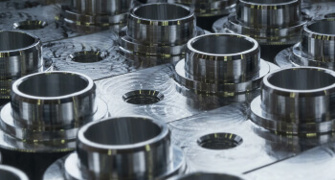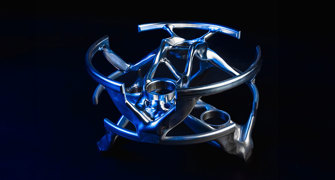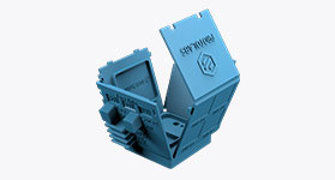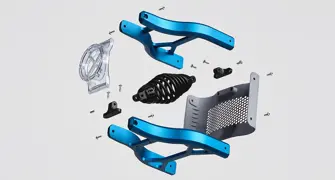Talk with Our Team
Hello! We just need a few bits of information then a manufacturing expert will reach out to you directly to see we how can partner on a future production project.
Thank you! We've received your request and a member of our team will reach out shortly.
Robotic Automation and Artificial Intelligence
Streamline and accelerate development of robotics innovation with rapid prototyping and on-demand production
Certification + Compliance
ISO 9001:2015
How do Robotics Companies Use Protolabs?
Rapid Prototyping
Take advantage of design for manufacturability (DFM) feedback in our instant quotes to make adjustments to part design before any manufacturing begins, then navigate quickly through early- and late-stage prototyping with ease.
On-Demand Production
Whether it be custom parts at low volumes or repeatable parts at higher quantities, build agility into your supply chain by ordering quick-turn parts when needed.
Maintenance, Repair, and Operations (MRO)
Order custom production parts on demand for MRO applications to keep robotics equipment running without delay.
Quality Certifications & Traceability
Take advantage of our ISO 9001-certified manufacturing process for high-requirement parts.
Range of Materials
Choose from machined metals like aluminium, titanium, and stainless steel 17-4 PH along with plastics such as POM and elastomeric resins.
| We are the fastest and most comprehensive digital manufacturer in the industry with more than 25 years of experience developing products for innovative robotics companies around the world. | 96% of Fortune 500 Robotics Companies Served |
700 Million Parts Manufactured |
300,000 Customers Served |
Full Production Support Team
| We have a team of manufacturing experts working behind the scenes to fulfil your production order—we manage the entire process and keep you updated along the way. |

Account Manager
A dedicated account manager provides support, including assistance with platform and file uploads.

Applications Engineers
Expert CAD solutions and cost-reduction strategies tailored by in-house applications engineers to optimise your designs.

Logistics
Seamless logistics fulfilment and efficiency optimisation from experienced operations specialists.

Quality Control
Our expert on-site quality control teams ensure your parts meet your expectations and exact specifications.
Manufacturing Services for Robotics and AI Products
Injection Moulding
Get affordable, high-quality moulded parts and bridge tooling within days. With our free mouldability consultation, the design and moulding process is rapidly accelerated to save you time and money.
- Low-volume moulding up to 100,000+ parts with volume pricing available—no MOQ required
- 100+ plastic, elastomeric, and silicone rubber materials
- Automated CMM for fast, in-house quality documentation
CNC Machining
Leverage the same speed, precision, and reliability in machining that you’re accustomed to at Protolabs but unlock advanced machining capabilities like tighter tolerances and volume pricing through our manufacturing network.
- Machined parts in as fast as 1 day with optional plating and anodizing in as fast as 4 days
- Cost-efficient machined parts at higher volumes
- Tolerances down to ±0.001 in. (0.020 mm) through our digital network, with tighter tolerances available upon request
3D Printing
Want quality parts and additive expertise at a single 3D printing source? Choose from seven different additive manufacturing technologies for cost-effective prototyping and highly precise, repeatable production parts.
- Additive technologies include metal 3D printing, SLA, SLS, FDM, and more
- 30 plastic and metal materials in a range of finishes
- 25 years of additive manufacturing expertise

Quality Measures for Robotics Industry
Our industry-standard procedures and certifications guarantee quality and regulatory compliance.
| CMM inspection report | First Article Inspection (FAI) |
| Dimensional Inspection Report (DIR) | Prop65 |
| Material Certificates + Certificate of Analysis | Conflict Minerals Reporting |
| REACH + RoHS Certificates | AS 9100 via Protolabs Network |
| Certificate of Conformance (CoC) | Manufacturing partners in our network certified with PPAP, ISO 13485 |
Materials for Robotics Applications

Aluminium
A popular choice for the robotics industry due to its lightweighting capabilities. Certain alloys also display corrosion resistance, good weldability, and high heat resistance, all important properties to have for applications in the robotics industry.

Stainless Steel
A common material used by those in the robotics industry. Stainless steel is a solid choice for components on robotic applications that need to be durable and survive repeatable processes and harsh conditions.

Acetal/Delrin
Acetal boasts excellent dimensional stability and has low friction, both critical characteristics for robotic components that may be sliding or performing repeatable actions. And it's relatively inexpensive compared to other common materials used in the industry.
Elastomers
Elastomers are becoming increasingly popular in the robotics industry due to the rise of soft robotics, which are used for more delicate tasks that require a less heavy hand. These materials are also used for internal components in standard robots, such as semiconductors and casings where flex is needed.
Common Robotics Applications
We have several capabilities within our manufacturing services catered to the robotics industry. Here are a few applications we frequently see.
|
|

Precision Manufacturing for Robotics Industry
Robotics is a diverse, relatively new industry, but most prominent in the industrial and manufacturing sectors. Applications here include robotic arms, collaborative robots (aka cobots), robotic process automation, integrated artificial intelligence (AI), predictive maintenance, and service robots. For components created for the robotics industry, dimensional accuracy is vital. Parts are complex and must be precise to work in sync with other components assembled within a robot. Surviving the stresses of repeatable actions is also essential. Other key considerations include customisability, low-friction surface finishes and complex geometries. And that's why digital manufacturing is uniquely valuable in the production and assembly of parts for the robotics industry.












